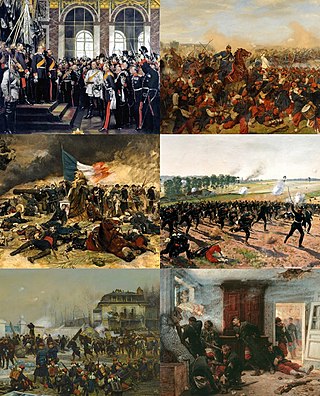
The Franco-Prussian War or Franco-German War, often referred to in France as the War of 1870, was a conflict between the Second French Empire and the North German Confederation led by the Kingdom of Prussia. Lasting from 19 July 1870 to 28 January 1871, the conflict was caused primarily by France's determination to reassert its dominant position in continental Europe, which appeared in question following the decisive Prussian victory over Austria in 1866. According to some historians, Prussian chancellor Otto von Bismarck deliberately provoked the French into declaring war on Prussia in order to induce four independent southern German states—Baden, Württemberg, Bavaria and Hesse-Darmstadt—to join the North German Confederation; other historians contend that Bismarck exploited the circumstances as they unfolded. All agree that Bismarck recognized the potential for new German alliances, given the situation as a whole.
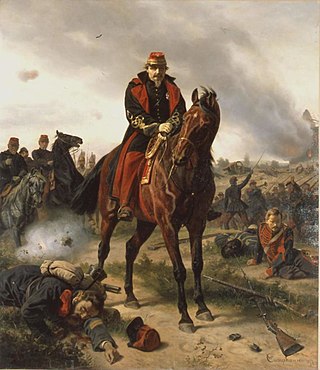
The Battle of Sedan was fought during the Franco-Prussian War from 1 to 2 September 1870. Resulting in the capture of Emperor Napoleon III and over a hundred thousand troops, it effectively decided the war in favour of Prussia and its allies, though fighting continued under a new French government.
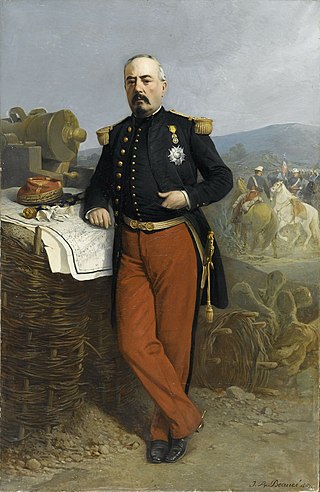
François Achille Bazaine was an officer of the French army. Rising from the ranks, during four decades of distinguished service under Louis-Philippe and then Napoleon III, he held every rank in the army from fusilier to Marshal of France, the latter in 1863.

The Battle of Gravelotte on 18 August 1870 was the largest battle of the Franco-Prussian War. Named after Gravelotte, a village in Lorraine, it was fought about 6 miles (9.7 km) west of Metz, where on the previous day, having intercepted the French army's retreat to the west at the Battle of Mars-la-Tour, the Prussians were now closing in to complete the destruction of the French forces.

The fortifications of Metz, a city in northeastern France, are extensive, due to the city's strategic position near the border of France and Germany. After the Franco-Prussian War of 1870, the area was annexed by the newly created German Empire in 1871 by the Treaty of Frankfurt and became the Reichsland Alsace–Lorraine. The German Army decided to build a fortress line from Mulhouse to Luxembourg to protect their new territories. The centerpiece of this line was the Moselstellung between Metz and Thionville, in Lorraine.

The siege of Metz was a battle fought during the Franco-Prussian War from August 19 to October 27, 1870 and ended in a decisive allied German victory.

The Battle of St. Quentin took place during the Franco-Prussian War when Prussian forces defeated French attempts to relieve the besieged city of Paris.

The Battle of Mars-la-Tour was fought on 16 August 1870, during the Franco-Prussian War, near the village of Mars-La-Tour in northeast France. One Prussian corps, reinforced by two more later in the day, encountered the entire French Army of the Rhine in a meeting engagement and, following the course of battle, the Army of the Rhine retreated toward the fortress of Metz.
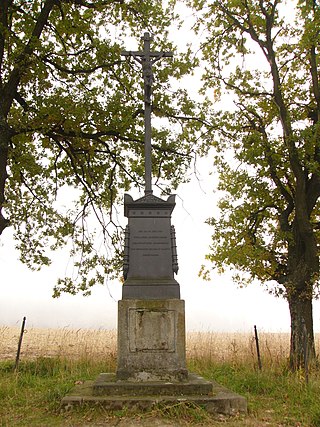
The Battle of Domstadtl was a battle between the Habsburg monarchy and the Kingdom of Prussia in the Moravian village of Domašov nad Bystřicí during the Third Silesian War on 30 June 1758, preceded by a minor clash at Guntramovice (Gundersdorf) on 28 June. Austrians under the command of Major General Ernst Gideon von Laudon and Major General Joseph von Siskovits attacked and destroyed a supply convoy bound for the Prussian army besieging Olomouc (Olmütz). The Austrian victory saved the city and the Prussian King Frederick the Great was forced to leave Moravia.

The Battle of Bellevue on 7 October 1870 was fought during the Franco-Prussian War and ended in a Prussian victory.
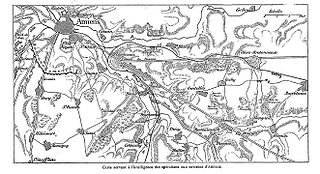
The Battle of Amiens, also known as the Battle of Villers-Bretonneux, was fought on 27 November 1870 between French and Prussian forces during the Franco-Prussian War (1870–1871). It ended in a Prussian victory, forcing the French to retreat and allowing the Prussians to capture Amiens, France.
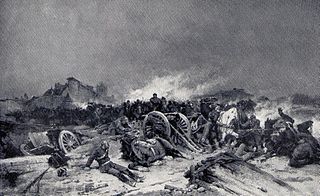
The Battle of Beaune-la-Rolande on 28 November 1870 took place during the Franco-Prussian War, which was won by Prussia. In an attempt to relieve the Siege of Paris, French General Crouzat's XX Corps launched an attack against three Prussian brigades resting in Beaune-la-Rolande. These brigades were from the Prussian X Corps which was detailed to guard the flanks and rear of the force besieging Paris and provide early warning of any French counter-attacks. The French committed a force of 60,000 men, largely conscripts of the Garde Mobile, and 140 guns against the Prussians' 9,000 men and 70 guns, mostly drawn from regular troops, although military historian Gaston Bodart estimated their strength at 40,000 men and 174 guns. Despite the superiority of numbers the French attack failed to take the village and was ultimately forced to retreat by Prussian reinforcements.

The Royal Prussian Army served as the army of the Kingdom of Prussia. It became vital to the development of Prussia as a European power.

Noisseville is a commune in the Moselle department in Grand Est in north-eastern France.

The Battle of Villersexel took place on 9 January 1871 as part of the Franco-Prussian War. Elements of the French Armée de l'Est under General Bourbaki engaged August von Werder's German forces. It resulted in a French victory.
The Fort de Plappeville, or Feste Alvensleben, is a military fortification located to the northwest of Metz in the commune of Plappeville. As part of the first ring of the fortifications of Metz, it is an early example of a Séré de Rivières system fort. While it did not see action during World War I, it was the scene of heavy fighting between American forces and German defenders at the end of the Battle of Metz, in 1944. After Second World War it became a training center for the French Air Force. Fort 'Alvensleben' has been abandoned since 1995.

The siege of Montmédy was a battle of the Franco-Prussian War at the small commune of Montmédy, in the Meuse, it was besieged by the army of the German coalition. Defended by the 57th Line Infantry Regiment, the Garde Mobile and elements of other units, it surrendered on December 14, 1870.
The siege of Verdun was a battle fought in France during the Franco-Prussian War from 13 October until 8 November 1870.
The Battle of Ladon and Mézières was fought at Ladon and Mézières-en-Gâtinais between the French Army of the Loire led by Louis d'Aurelle de Paladines and Imperial German Army led by Prince Friedrich Karl of Prussia on November 17, 1870. During the battle the Prussians forced the French forces to retreat into the Bellegarde woods. Although the French army was quickly defeated in this battle, it showed the Prussians the substantial size of the French XX corps. the engagement showed the Germans that substantial forces of the French XX Corps were present on the battlefield. The defeat caused great damage to French morale. On November 17 the French attacked the Prussians again at the Battle of Beaune-la-Rolande, but they were defeated again.
The siege of Mézières was a siege battle during the Franco-Prussian War, it took place from November 17, 1870 until January 2, 1871, in Mézières-en-Gâtinais which is located on the banks right of the river Meuse in France. After suffering from a German artillery strike, the French army at Mézières under the command of Colonel Vernet, surrendered to Germany under the command of Major General Wilhelm von Woyna on January 2, 1871. Although lasting just over a day, German artillery bombardment caused French defenders and civilians in Mézières heavy losses. With the victory, the Germans captured many French officers and soldiers, with many cannons and supplies from the enemy's reserves. Not only that, the victory at the Siege of Mézières made the German army have complete dominance of the railway line in the north extending from Metz and Mézières to Paris, capital of France.
















